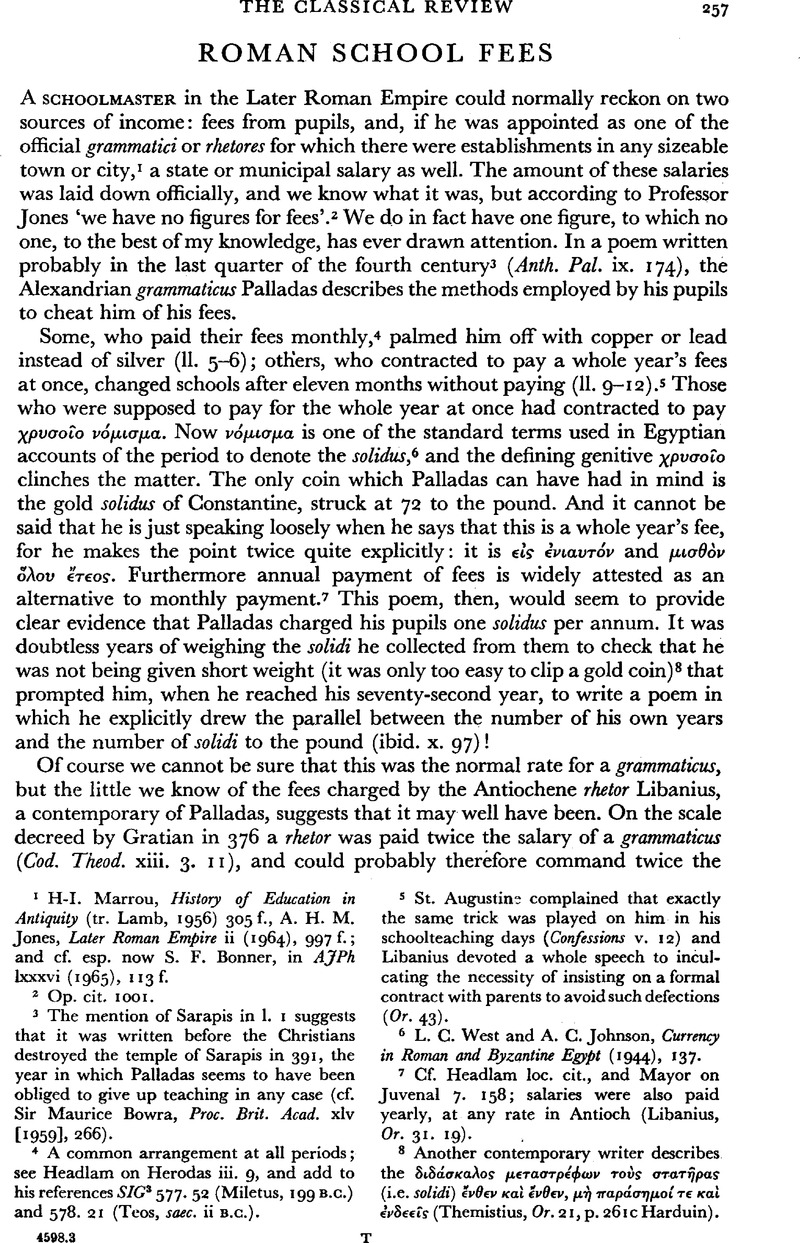Article contents
Roman School Fees
Published online by Cambridge University Press: 27 February 2009
Abstract

- Type
- Review Article
- Information
- Copyright
- Copyright © The Classical Association 1965
References
page 257 note 1 H-I. Marrou, , History of Education in Antiquity (tr. Lamb, , 1956) 305 f.Google Scholar, Jones, A. H. M., Later Roman Empire ii (1964), 997 f.Google Scholar; and cf. esp. now Bonner, S. F., in AJPh llxxxvi (1965), 113f.Google Scholar
page 257 note 2 Op. cit. 100.
page 257 note 3 The mention of Sarapis in 1. 1 suggests that it was written before the Christians destroyed the temple of Sarapis in 391, the year in which Palladas seems to have been obliged to give up teaching in any case (cf. Sir Bowra, Maurice, Proc. Brit. Acad. xlv [1959], 266).Google Scholar
page 257 note 4 A common arrangement at all periods; see Headlam on Herodas iii. 9, and add to his references SIG3577. 52 (Miletus, 199 B.C.) and 578. 21 (Teos, saec.ii B.C.).
page 257 note 5 St. Augustin: complained that exactly the same trick was played on him in his schoolteaching days (Confessions v. 12) and Libanius devoted a whole speech to inculcating; the necessity of insisting on a formal contract with parents to avoid such defections (Or. 43).
page 257 note 6 West, L. C. and Johnson, A. C., Currency in Roman and Byzantine Egypt (1944), 137.Google Scholar
page 257 note 7 Cf. Headlam loc. cit., and Mayor on Juvenal 7. 158; salaries were also paid yearly, at any rate in Antioch (Libanius, Or. 31. 19).
page 257 note 8 Another contemporary writer describes the διδάσκαλος μεταστρέφων τοὺς στατῆρας (i.e. solidi)ἔνθεν καὶ ἔνθεν, μὴ παράσημοί τε καὶ ἐνδεεῖς (Themistius Or.21, p. 261c Harduin).
page 258 note 1 Petit, P., Les ´udiants de Libanius (1957) ch. iii.Google Scholar
page 258 note 2 ix. 175. 3 and cf. § ii ad Jin. of my article in JRS lv (1965).
page 258 note 3 A grammaticus was paid the equivalent of 50 solidi p.a. on Gratian's scale; one man's rations for a year in Egypt in Palladas' day sugworked out at about 5½ solidi and women and children were reckoned to eat much less (cf. Jones, op. cit. 447 f.). Palladas should therefore have been able to keep his wife, family, and pets quite comfortably on his salary (especially as teachers were nor-mally exempt from taxes), even if he got comparatively little additional income in the way of fees. Anth. Palxi. 291 sugworked gests that he did not earn anything from his poetry.
- 1
- Cited by


